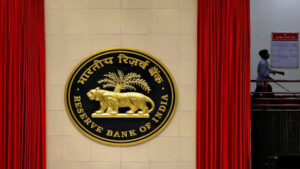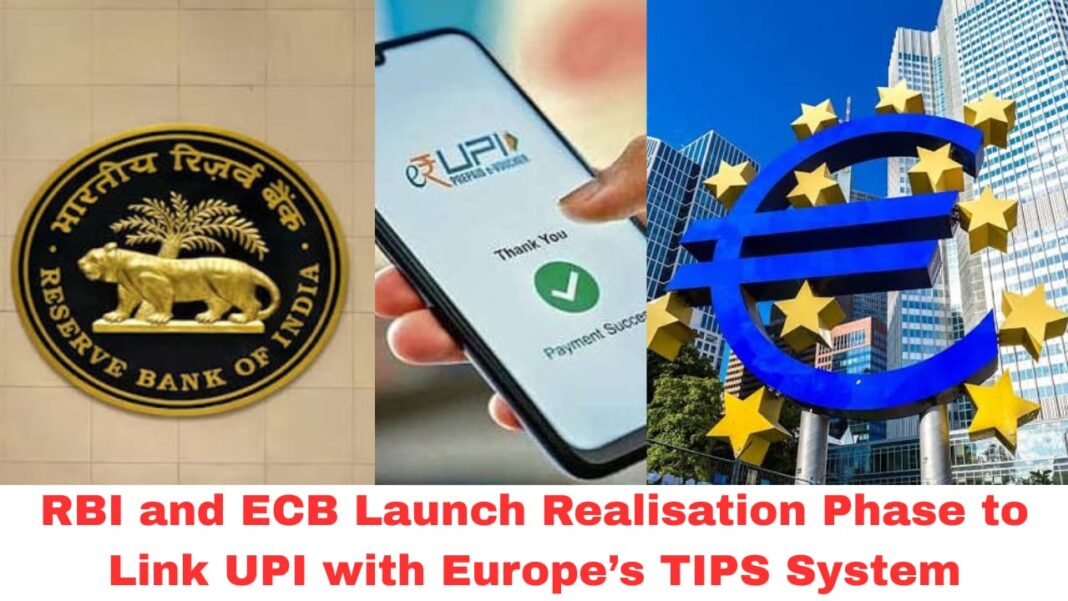Digital News Guru Business Desk:
UPI-TIPS Cross-Border Payment Link Begins: RBI and ECB Move Forward
In a landmark step for global digital payments, the Reserve Bank of India (RBI) and the European Central Bank (ECB) have agreed to begin the “realisation phase” of interlinking India’s Unified Payments Interface (UPI) with Europe’s TARGET Instant Payment Settlement (TIPS) system. This move is expected to dramatically improve how remittances flow between India and the euro area — making transfers faster, cheaper, and more seamless for businesses and individuals.
What Is the UPI–TIPS Link?
UPI, developed by the National Payments Corporation of India (NPCI) and regulated by the RBI, is India’s flagship real-time payments infrastructure. TIPS, on the other hand, is the Eurosystem’s instant payment settlement platform, operated by the ECB, which allows instant payments across euro-area countries.

According to the ECB, its Governing Council has approved the start of the realisation phase for the UPI–TIPS connection. On the Indian side, the RBI confirmed that it, along with NPCI International Payments Ltd (NIPL), will work closely with the ECB to finalize the technical integration, risk-management protocols, and settlement mechanisms.
Why This Matters
- Cheaper, Faster Cross-Border Remittances
One of the biggest advantages is cost savings. The UPI–TIPS link could significantly reduce transfer fees for remittances between Europe and India. Real-time settlement through TIPS and UPI would also eliminate many of the delays associated with traditional cross-border payment systems.
- Boost for Indian Diaspora & Euro-Area Businesses
Millions of Indians living in Europe regularly send money home. With this new link, they may be able to do so more efficiently. On the flip side, European businesses that trade with Indian counterparts could benefit from streamlined, near-instant payments.
- Global Ambition for UPI
Through NIPL, India has been aggressively working to internationalize UPI. The link with TIPS is a critical step in making UPI not just a national system, but a truly global payment rail — aligning with India’s broader vision of exporting its digital payments infrastructure.
- G20 Alignment
This initiative aligns well with the G20 roadmap to make cross-border payments faster, cheaper, more transparent, and more inclusive. By interoperating with global fast-payment systems, both the ECB and RBI aim to meet these very goals.
Implementation Challenges & Considerations
While the announcement is exciting, making the link operational will be complex:
- Technical Integration: Bridging two very different payment networks across jurisdictions involves building robust infrastructure, testing, and aligning on standards.
- Legal & Regulatory Framework: Both sides need to complete legal arrangements to govern cross-border settlements.

- Risk & Compliance: Cross-border payments always carry compliance risk (KYC, AML). The RBI and ECB will need to establish strong risk-management protocols.
- User Adoption: Even if the infrastructure is ready, it remains to be seen how quickly users on both sides adopt the system — especially small remitters and merchants.
- Scalability: The system needs to be scalable to handle large trade-related payments and high remittance volumes.
Strategic Implications
- Strengthening Trade Ties
By enabling smoother payments, this move could deepen trade and investment between India and the euro area. Faster, low-cost payments make it easier for European firms to engage with Indian suppliers, and vice versa. - UPI as a Global Player
If successful, the UPI–TIPS link could be a powerful proof point for UPI’s global relevance. It may pave the way for similar links with other major fast-payment systems, enhancing India’s fintech diplomacy. - Financial Inclusion & Economic Impact
Lower cross-border payment costs can particularly benefit migrant workers and small businesses. This could have broader social and economic implications, supporting remittance-driven economies and boosting financial inclusion. - Geopolitical Resonance
Digital finance is increasingly becoming part of economic diplomacy. By building a bridge between Indian and European payments architecture, this initiative may bolster India’s economic ties with Europe and strengthen its role in global financial infrastructure.
What Next?
- Testing & Pilot Roll-Out: Once legal and technical work is complete, pilot testing will likely begin. This could involve specific corridors, such as remittances from select European countries to India.
- Monitoring & Adjustments: Regulators on both sides will need to monitor system performance, transaction volume, and user behavior. Continuous feedback will shape how the link is scaled.
- Expanding to Other Corridors: Success with Europe could spur similar efforts with other regions. The ECB’s TIPS strategy already includes exploring multilateral links.
- Merchant Acceptance: Over time, UPI–based payments may become more accepted in Europe, especially for Indian travelers or cross-border merchant payments.

Conclusion
The move by the RBI and the ECB to begin the realisation phase for linking India’s UPI with Europe’s TIPS platform is a watershed moment in cross-border payments. It promises to lower the cost and friction of remittances, deepen financial integration between India and Europe, and boost UPI’s global credibility. While challenges remain — from technical hurdles to regulatory alignment — the potential benefits for individuals, businesses, and the broader digital economy are significant.
If everything goes to plan, this link could become a blueprint for future international payment corridors — reinforcing digital payments as a cornerstone of global economic cooperation.
You May Also Read: A Bollywood-Style Heist in Broad Daylight: 7 Crore Van Robbed in Bengaluru








